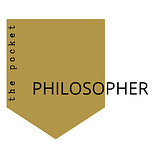Friends,
I hope you enjoyed taking a small piece out of the enormous topic that is the philosophy of mindfulness.
Today, as with every Friday, we’re going to do a short a recap of this week’s letters and a conclusion to connect the overarching discoveries we’ve made.
I’m grateful for you and the time that you all take to engage, read, and share what we’re building here!
Monday
But if the same things appear different…we shall, indeed, be able to state our own impressions of the real object, but as to its essential nature we shall suspend judgement.
—Sextus Empiricus, Outlines of Pyrrhonism
The above quote comes from Sextus Empricus’ research into the anatomy of various kinds of animals compared to humans.
He is processing an interesting observation: that we are very similar to other animals in some respects, and very different in others. And Sextus concluded that where we are different we are incapable of truly knowing “what it is like” to be anything other than human.
And it was in this simple reflection that Sextus Empiricus leaves behind that a fundamental theme of Skepticism is laid: the Suspense of Judgement.
And this Suspense of Judgement is at the core of mindfulness and its practice in almost every context we find it. Much of early Greek philosophy (think Stoicism for example) depends on the discernment between what we are capable of understanding and where we must admit a lack of knowledge or capacity.
The Suspense of Judgement allows us to turn off a mind of criticism and dualism and move into a space of accepting the way things are, especially if we cannot understand them.
Tuesday
One who has control over the mind
Is tranquil in heat and cold,
In pleasure and pain, and in honor and dishonor;
And is ever steadfast with the Supreme Self.
—The Bhagavad Gita, 6.7
There exists (so far as I can tell) really 4 or so primary ways that people from within these traditions [those of the Indus River Valley] have used to help to cultivate mindfulness:
Karma Yoga (work in the world)
Jnana Yoga (intellectual growth)
Bhakti Yoga (devotion)
Dyhana Yoga (meditation)
Yoga is a word most referring to any discipline or practice that leads to a desired awareness. In western countries like America, they mostly refer to “yoga” as a general term for various types of Asana, or posture, yoga. Rather, Asana is a separate yogic discipline with its own history and desired outcomes.
But today we are most interested in Dyhana Yoga. And inside of Dyhana meditation is the road that leads to a state of bliss or transcendence through which one finds a deeper Self.
The intention is to quiet the mind and find what exists in between the space of constant thought. What is there, who is having those thoughts, who is observing the thinking and feeling?
That taking a step back into a quiet, observational posture is the beginning of the discovery that you are in fact not your “self,” but something much deeper and grander than your day to day experiences. This is the deepest practice of mindful awareness.
Wednesday
What it is not is a particular state that, if you were really good at meditating, you’d be there and then you could get back to it whenever you wanted. And that’s your home base that never deviates. If you try to approach it that way, you’ll always be striving to get to some special state that you’re imagining is what mindfulness is all about and actually missing how special the condition of this present moment is, no matter what.
—Jon Kabat-Zinn in an interview with Barry Boyce
Unlike other molecular biologists, Jon Kabat-Zinn was intrigued by the mind, the body, and the space in between. He’s spent his professional (and much of his personal) life examining and testing the boundaries of mindfulness.
The greatest wisdom that Jon leaves for us can be found in the above quote. The type of mindfulness he encourages us to cultivate is the kind which can only be found when we forget we are looking for it.
In many respects, the idea of being mindful, practicing meditation, controlling your mind, becoming a yogi—whatever the case may be, can put up a barrier mentally to simply moving into the seat of an observer.
And at the heart of mindfulness is that simple shift from an actor who is wrapped up in the drama of the play, to one in the audience observing safely from their seat.
Thursday
Mindfulness effectively helps us learn how to both downregulate emotional activation by shifting our attention away from distressing and ruminating thoughts, while simultaneously feeling into difficult emotions and learning how to develop distress tolerance, acceptance, and self-empathy.
—Andrew Chapman, Wildheart Meditation Center
I so identify with the mind of a wanderer. Though I want to be one with mastery over my thoughts, it’s usually the other way around. The above quote from Andrew Chapman is so helpful and offers so much solidarity as I work to evolve in that way.
This tension between regulation and feeling is fascinating in my opinion. Without being intentional, I spend my mental energy largely on uncontrolled rumination from the past and anxieties about the future. It’s easy when practicing mindfulness to want to move in two directions: either ignoring or denying the deeper causes of our un-ease, or using mindfulness as a “trick” to fix ourselves.
Somehow neither of those approaches is super helpful, and rather mindfulness lies somewhere between those to opposite poles—that is self-denial and self-obsession.
Mindfulness is a way to temporarily step into a bird’s eye view, observe one’s emotions, explore how and why one feels the way they do, and acknowledge objectively whatever is happening.

Conclusion
I’d be lying to you if I didn’t say I felt overwhelmed this week. As I began consolidating my research I felt I was in a bit over my head at times. There are so many ways to broach this topic, and beyond that this word can mean so many different things depending on the user.
If we can somehow though find an aperture that is large enough to include modern mental health practices on one side, and profoundly religious practice on the other I believe we can mine a few key themes that can support us in our mission of increasing our empathy and compassion.
Above all, mindfulness is about moving from judgement to observation. This subtle ability it truly a superpower with rippling effects that touch every aspect of our life, health, and mental well-being.
Breath is a great tool to help us observe when we are prone to judge (especially when we want to judge ourselves).
Mindfulness is a lifestyle we cultivate, not a state we can achieve.
Acceptance—of self, others, victories, failures—often occurs when our ability to observe instead of react creates “slack” in our body and mind.
Self-compassion is both a necessity and reward of a quiet mind.
There is honestly so much more we could say, but I hope this is a helpful, bite-sized version to take you into the weekend.
Please comment and share, I’m very curious to hear what your key takeaways from this week are.
Have a great weekend, we’ll see you next week friends!
-Matt














Share this post